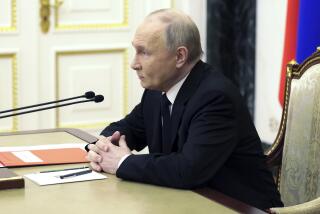THE SUMMIT AFTERMATH : Baker Will Press Shevardnadze for Details on German Plan : Unification: Soviets suggest a pact between rival alliances. They say it might ease their objections to NATO membership for the new nation.
- Share via
SHANNON, Ireland — Secretary of State James A. Baker III said Monday that he will press for details of a Soviet plan for some sort of new relationship between NATO and the Warsaw Pact when he meets Soviet Foreign Minister Eduard A. Shevardnadze today in Copenhagen.
“We will obviously spend quite a bit of time to flesh out this suggestion for a possible NATO-Warsaw Pact agreement,” Baker told reporters aboard his Air Force jet on the way to his fourth meeting with Shevardnadze in just over a month.
Baker said Soviet officials floated the idea of a formal agreement between the rival military blocs as a way to soften their objections to a reunified Germany obtaining full membership in the North Atlantic Treaty Organization.
Baker said the Soviets offered no details of the plan. He said Moscow’s objective seems to be to find a way to deflate the objections of the Soviet public to German NATO membership.
A ranking State Department official aboard the aircraft said the Soviets have raised a lengthening list of proposals to break the impasse over German reunification but have been unable to explain the full implications of any of them.
“I think they are still feeling their way because when you press them for details, you don’t get any,” the official said. “Perhaps they are buying time.”
Nevertheless, the official said Washington will not dismiss the Soviet proposal out of hand.
“It’s something that might be worth exploring if they can flesh it out a little bit for us,” the official said.
He added that Washington would accept the suggestion only if “it is made clear that this would not in any way supplant the security role of the NATO alliance.”
Baker and Shevardnadze will be in Copenhagen to attend a meeting of the 35-nation Conference on Security and Cooperation in Europe.
Although Baker and Shevardnadze seldom miss a chance for face-to-face talks when they are attending the same international diplomatic event, the Copenhagen meeting might be an exception because it comes just two days after they were together at the Washington summit.
However, President Bush and Soviet President Mikhail S. Gorbachev assigned the perplexing German unification question to their foreign ministers when the issue proved to be too tough to solve at the summit. Baker said he is eager to get to the task.
The ranking official said he considers it significant that Gorbachev and other Soviet officials have conceded that a unified Germany is entitled, under the 15-year-old Helsinki accords, to join NATO or any other alliance of its own choosing.
This Soviet concession--first mentioned Sunday by Bush in his joint press conference with Gorbachev but not publicly acknowledged by the Soviet president--would seem to end the matter. Leading politicians in both West Germany and East Germany have said they favor NATO membership after reunification.
But the U.S. official said it may not be that simple.
“I really think it is significant if they say and we all say that it’s really up to the country to determine what alliance it wants to belong to--that’s a pretty persuasive argument for recognizing a determination so made,” the official said.
“But that’s a different question from the question of Soviet acquiescence and the devolution of the four-power responsibilities,” he said, referring to the legal rights retained in Germany by the four World War II victors--the United States, the Soviet Union, Britain and France.
“I think it is one thing to say that (the Soviets) recognize a country’s right to enter into an alliance of its choosing, but that doesn’t necessarily carry with it acquiescence and all devolution of rights and responsibilities.”
More to Read
Sign up for Essential California
The most important California stories and recommendations in your inbox every morning.
You may occasionally receive promotional content from the Los Angeles Times.










